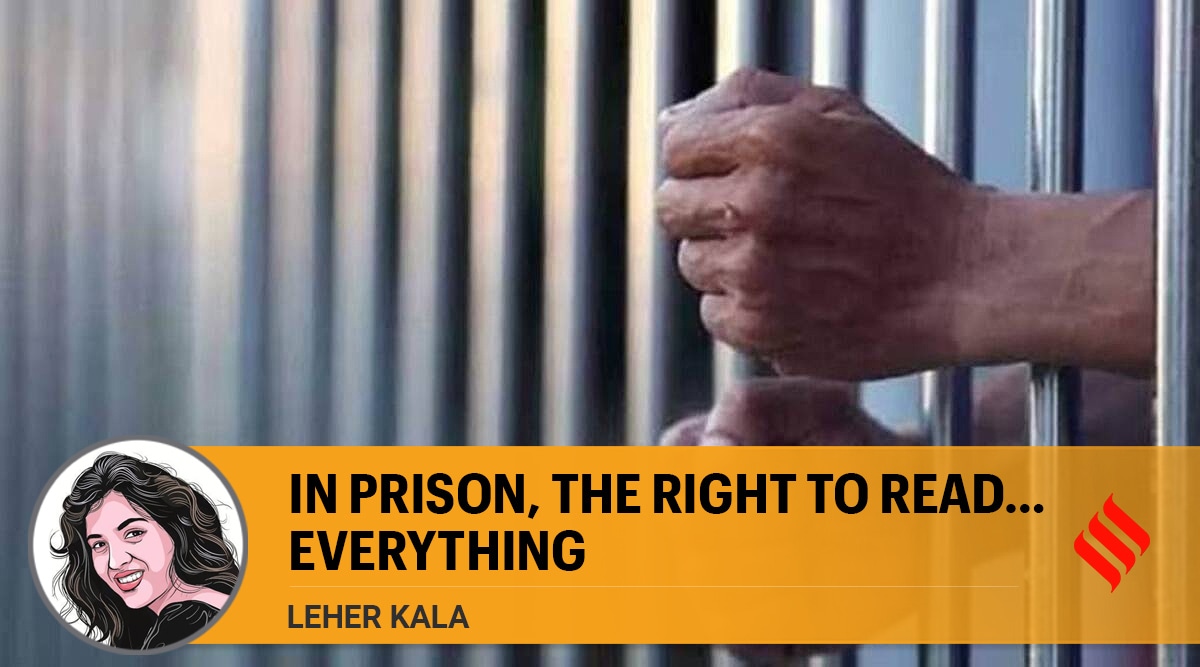Opinion In prison, the right to read… everything
Leher Kala writes: In this day and age, it’s hard to justify denying prisoners a wide range of reading materials, newspapers and magazines, crucial to keep up with the dizzying pace of development in the outside world.
 One of the greatest challenges of this Covid year was to stay constructively occupied, on guard against the mind leaping all over the place.
One of the greatest challenges of this Covid year was to stay constructively occupied, on guard against the mind leaping all over the place. While lodged in Mumbai’s Arthur Road Jail for over a fortnight, Shah Rukh Khan’s son Aryan is said to have coped by reading. It’s anybody’s guess whether it was a question of (desperate) optics, but according to some newspaper reports, Aryan borrowed religious books from the meagre prison library. It was news to me that only very specific religious and philosophy texts are permitted in jails. Apparently, world over, prisoners are not always deemed worthy of the flights of imagination that fiction allows. Alas, in a penitentiary, even the freedom to choose what to read comes with strict riders.
At the most basic level, for centuries, the idea behind incarceration has been to create an atmosphere that induces remorse for committing crimes. The severity of towering prison walls, barbed wire fences and dank, cheerless cells intentionally imparts fear that serves as a deterrent or a dire warning of the misery which awaits the unhappy being trapped within its walls. For someone suddenly thrust in a cell, chances are that the prevailing sentiments would be anguish and terror, much more than contrition for wrongdoings. How do you get inmates to reflect on their unsavoury behavior? There’s certainly no penance in reading Stephen King. No wonder then, prisons focus on ancient religious and spiritual books that provide some sort of blueprint for a conscience — the presumption being that a lack of empathy and a flawed understanding of concepts of right and wrong landed one in jail in the first place.
In the deeply discomfiting novel The White Tiger, the murderous protagonist observes, no boy remembers his schooling like the one who was taken out of school. Repeated studies have shown a connection between criminality, troubled childhoods and poverty. The shortfall in moral direction and education, denied to so many in their formative years by adverse circumstances, is, ironically enough, addressed in jail through learning programmes. A 2014 study by psychologists in the US found that bibliotherapy and access to libraries help ease inmates’ depression and are an important tool for rehabilitation. A lot of people languishing in jails, like Aryan was, for instance, have not yet been convicted and may spend months or years awaiting trial. In this day and age, it’s hard to justify denying prisoners a wide range of reading materials, newspapers and magazines, crucial to keep up with the dizzying pace of development in the outside world.
 Earlier this year, a special court intervened and allowed lawyer-activist Sudha Bharadwaj, arrested in the Elgaar Parishad case, access to five books, after jail authorities refused to let her read Empire of Cotton: A Global History. It’s an academic work on how European entrepreneurs recast the world’s most significant manufacturing industry, contributing to their countries’ imperialist ambitions. Hardly a topic that could instigate a fiery revolt in jail, but the power the State holds over prisoners in these matters is complete. The modern penitentiary may have done away with public hangings, whippings and solitary confinement, but they can break a spirit with small vindictive penalties, just as easily.
Earlier this year, a special court intervened and allowed lawyer-activist Sudha Bharadwaj, arrested in the Elgaar Parishad case, access to five books, after jail authorities refused to let her read Empire of Cotton: A Global History. It’s an academic work on how European entrepreneurs recast the world’s most significant manufacturing industry, contributing to their countries’ imperialist ambitions. Hardly a topic that could instigate a fiery revolt in jail, but the power the State holds over prisoners in these matters is complete. The modern penitentiary may have done away with public hangings, whippings and solitary confinement, but they can break a spirit with small vindictive penalties, just as easily.
One of the greatest challenges of this Covid year was to stay constructively occupied, on guard against the mind leaping all over the place. It’s a pity that humanity hasn’t come up with a more humane form of punishment for deviance than stripping someone of their liberty and locking them away, without both emotional and intellectual sustenance.
In The Critique of Judgment, Kant argued that appreciation of beautiful things — symphonies, art, literature — leads to moral improvement. Not only is sensory deprivation unnecessarily cruel, the sublime power of books to positively impact those dealing with excruciating confinement cannot be estimated.
The writer is director, Hutkay Films


